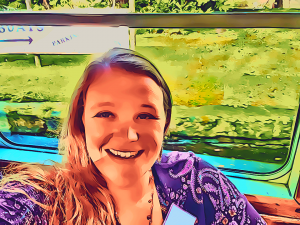113 Letter from Bailey Ashton Adie
 Dear wonderful future tourism researchers (who are doing a great job even if they don’t feel like it!),
Dear wonderful future tourism researchers (who are doing a great job even if they don’t feel like it!),
I want to first start by saying that I had never planned to be an academic, let alone a tourism academic. So if you ever feel that you don’t belong for whatever reason, I understand. Me too. This letter is for you.
I started my undergraduate degree at the University of Vermont in the US thinking I would go to law school, but one ethics class my first year quickly ended that dream. Then, I decided that a good use of my history degree would be to work in a museum, so off to grad school in the UK I went to study cultural heritage and international development. I am so thankful for my time there as it introduced me to development studies, which has strongly impacted who I have eventually become as an academic and as a person. Unfortunately, I graduated into a still deeply troubled job market as a result of the Great Recession. I applied to so many jobs and one PhD. The PhD, which was again in cultural heritage, was the only success, and so I moved again, this time to Italy.
While I had done my MA thesis on tourism marketing and development in India, I started to truly immerse myself in the tourism literature during my PhD, at least as much as one can be immersed while having no formal training in a subject. I won’t say that I did it fully on my own but the resources for tourism research were scant in a degree focused on cultural theory, as was the mentorship. In fact, I had to go out and find myself a PhD supervisor because none of the internal academics knew anything about tourism. So this leads me to my first piece of advice:
Find your people. Whether we are talking about mentors or co-authors or even just friends to rant with about life as a tourism academic, your people are the ones that you will turn to when professional life gets hard (and it will). Put yourself out there at conferences, if you can, and try to chat to everyone, not just the “big names”. I have met some of my best collaborators and academic friends this way. A good group of colleagues that you can rely on no matter what is priceless in academia.
Since my PhD, there have been a lot of ups and downs professionally, especially when it comes to employment, and so my second piece of advice is:
Life is too short to live for other people. If you want to (and can) spend a year or two trying to find an academic job, that’s great. But, equally, if you can’t or don’t want to do that, for whatever reason…that’s great too. Do not get hung up on other people’s expectations of what you should do or who you are. Do what is best for you. Tourism research doesn’t exist solely in a university setting.
During my time in academia, I’ve often been advised to adapt my personality to fit in better, to somehow soften my edges to make others more comfortable. In response to this, my final pieces of advice are:
Be true to yourself and don’t be afraid to take up space. Don’t dull your sparkle to make someone else comfortable. It is ok to be yourself in academia. You do not have to bend and squish yourself into someone else’s definition of what a woman academic should be. We are all different and unique, and that is what makes research (and the world) so exciting as no one has the exact same viewpoint.
Speak truth to power. While I may not always have benefited from speaking up, I have never once regretted speaking for those who did not have my voice. Nothing will change if everyone stays silent.
You deserve to be here. There is so much adversity that you may face and so many battles still to fight, but you have gotten to this point through your own hard work. Imposter syndrome is often not something that we have when we start our academic journeys but is instead reinforced by others telling us we aren’t good enough. As hard as it is, try not to listen.
I hope that by the time someone reads this further in the future, things in academia have gotten better, but, if not, just remember this one thing: Don’t let the bastards grind you down. No matter what happens or how much pushback you may receive throughout your career, what you are doing matters.
You matter. And no one can take that away from you.
You got this,

Bailey Ashton Adie
Independent Scholar & Visiting Research Fellow, Wakayama University, Japan

